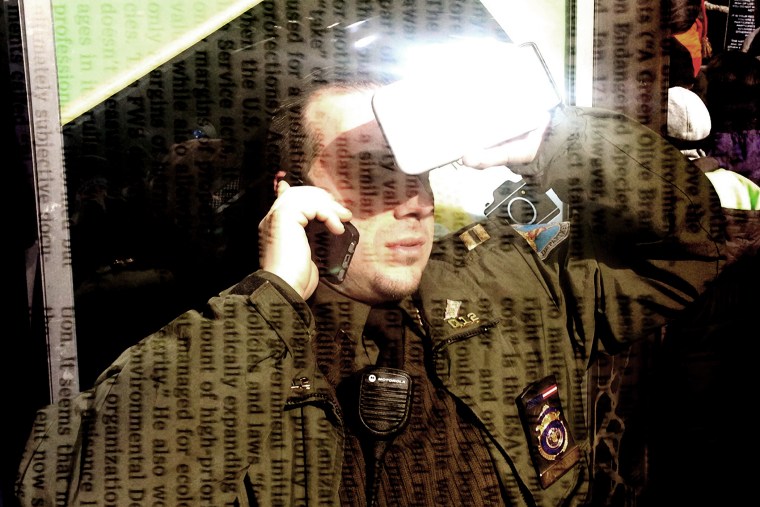The two major surveillance reform proposals unveiled Tuesday only touch on a sliver of the National Security Agency's powers — and neither would come close to what civil liberties advocates are seeking.
Monday evening descriptions of surveillance reform proposals began trickling into the press. One, from the White House, would end the NSA's bulk collection of phone records — detailing the time, duration, and numbers party to a call — by allowing telecommunications companies to hold onto the records and by requiring a court order to seek them. Another proposal, from the leadership of the House intelligence committee, would also end bulk collection of phone records, but the government would be able to seek data from companies prior to obtaining judicial approval, and a court would only scrutinize the acquisition after the fact.
Neither would go as far as the USA Freedom Act, supported by Wisconsin Republican Rep. Jim Sensenbrenner and Democratic Senator Patrick Leahy. That proposal would limit the entire menu of post-9/11 government surveillance powers.
"Right now the Obama proposal seems better and much more comprehensive, but again, these two proposals are trying to supercede proposals already on the table that end bulk collection and do a lot more," says Mark Jaycox of the Electronic Frontier Foundation. "These proposals are competing with one privacy advocates already do support."
While privacy advocates prefer the Obama administration's proposal to the one put forth by the House intelligence committee Tuesday or the Senate intelligence committee bill proposed months ago, as described in news reports, the White House plan would only affect collection of phone records. Yet the program, the breadth of which was first revealed through leaks facilitated by former NSA contractor Edward Snowden last June, is only one aspect of the government's claimed surveillance powers under Section 215 of the Patriot Act.
"We know that 215 is potentially used, and we have always suspected, that it's also used for financial records, credit card records, and we also know from the FISA court opinions that they used it for Internet metadata," says Jaycox, calling the phone records program "one patch of a veritable quilt."
That's why privacy advocates, while preferring Obama's proposal to the ones put forth by the intelligence committees, prefer the plan Sensenbrenner and Leahy are backing.
"The biggest problem with the Obama proposal is that it doesn't deal with other records collection under 215, much less all the other authorities," says Michelle Richardson of the American Civil Liberties Union. "The phone records program is just the tip of the iceberg." The NSA has also relied on legal authority granted in Section 702 of the FISA Amendments Act and Executive Order 12333 for some of its spying powers.
Democratic Rep. Adam Schiff, a member of the intelligence committee who proposed a bill similar to the plan the White House is backing, said that the focus on the phone records program doesn't mean other reform proposals are off the table.
"I'm assuming that this is not the end of what the administration is proposing, but the beginning," said Schiff. "I think they decided to focus on the phone records program first because that was of the most concern to the public."
As for the Sensenbrenner-Leahy proposal, Schiff said it would have a difficult time passing.
"I'm not sure that bill can move through the Congress," Schiff said. "I think what the president has proposed is much more likely to navigate the difficult political course on the Hill, because it is a good balance between the need to get the information to protect the country and protect the privacy interests of the public."
Privacy advocates take heart in the fact that the Obama administration and the intelligence committee proposals are positioning themselves as curbing the NSA program that thus far has been the focus of public outrage. Two government panels that have examined the NSA's phone records program have concluded that it has been of little use in preventing terror attacks, contrary to the agency's claims.
"The White House understands that we need to do something to deal with the issue of holding bulk collection because of the perception of our constituents," Maryland Democratic Rep. Dutch Ruppersberger, the ranking member on the intelligence committee, told reporters Tuesday.
Months after Snowden's initial leaks, political consensus seems to have coalesced around ending the NSA's phone records program. But if Congress can't agree on how to move forward, section 215 will expire next year anyway, and privacy advocates see an end to the phone records program as only the first step in a larger agenda.
"It's clear now that the phone records collection is going to end one way or another, and it's probably going to happen this year," says Richardson. "The bigger question is whether that can be parlayed into broader reform efforts."
